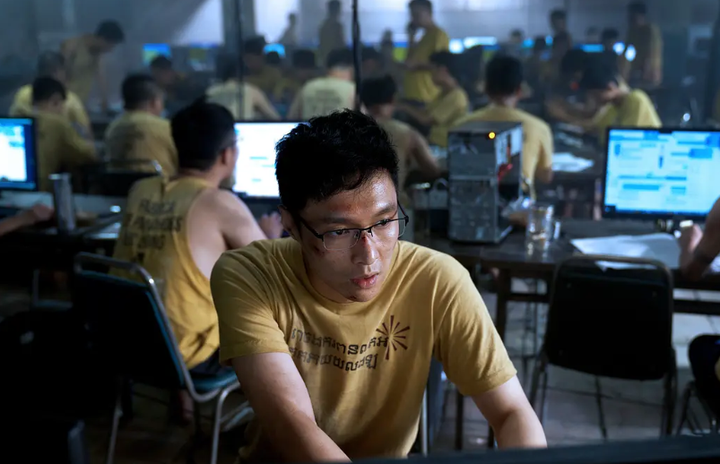The Dark Web of Crypto, Scams, and Human Tragedy: A Closer Look at Southeast Asia's Underbelly
- Xuande

- Nov 27, 2023
- 3 min read

In the 21st century, we have witnessed a remarkable evolution in the global economic landscape. The rise of cryptocurrencies and the internet has brought about significant changes, not all of them positive. In recent years, countries like Cambodia and Laos have become notorious hubs for illicit activities, including human trafficking, organ trade, and internet fraud. In this blog, we will delve into how these countries, plagued by loose regulations and domestic military conflicts, have become fertile grounds for such criminal enterprises, and the harrowing impact on the lives caught in this web.
Cryptocurrencies, with their decentralized nature, have revolutionized the financial world. They promise anonymity and freedom from traditional banking systems, but this has come at a cost. The lack of regulation and oversight has made cryptocurrencies the preferred medium for illicit transactions, including money laundering and funding criminal activities.
The internet, a tool for global connection and information sharing, has also become a playground for scammers. With the rise of online platforms, internet frauds have become increasingly sophisticated and widespread. The anonymity afforded by the digital world makes it easier for criminals to execute scams without being traced, leaving countless victims in financial and emotional ruin.
Cambodia and Laos, due to their strategic location in Southeast Asia, have emerged as central hubs for various illegal activities. The combination of loose regulations, domestic conflicts, and economic challenges has made these countries attractive to criminal syndicates. From human trafficking rings to organ trade networks, these nations have become a nexus of unlawful operations.
One of the most disturbing aspects of this dark economy is human trafficking. Vulnerable individuals, often lured by promises of high-paying jobs or a better life, find themselves trapped in a nightmare. Once in the clutches of traffickers, they are forced into labor, prostitution, or even organ harvesting. The physical and psychological toll on these victims is unimaginable.
Many victims of these criminal rings are from China, drawn to Southeast Asia by deceptive job advertisements or the promises of friends. They are often subjected to brutal conditions, and forced to work in scam operations targeting individuals across the globe. These Chinese nationals, seeking opportunities abroad, find themselves in a perilous situation, facing both physical and mental abuse.
The globalized world and the advent of technology have facilitated the reach of these criminal activities. With the ability to connect and communicate across borders, scammers and traffickers can operate on an international scale, making it increasingly challenging for law enforcement to track and dismantle these networks.
his alarming situation calls for urgent action and heightened awareness. Governments need to strengthen regulations, particularly concerning cryptocurrencies and internet platforms, to curb the growth of these illegal activities. Additionally, potential job seekers must be educated about the risks of overseas employment, particularly in regions known for criminal operations.

As we delve into the depths of these troubling developments in Southeast Asia, it's essential to reflect on the broader causes that have fueled this surge in illicit activities. From my perspective, a crucial factor contributing to this epidemic is the lack of proper legal and common education. This gap in knowledge and awareness has left many vulnerable to the deceptive lures of quick riches and false promises.
The stagnation of the Chinese economy has also played a significant role. With economic opportunities dwindling, the younger generation is increasingly desperate to escape financial hardships. This desperation often leads them into the treacherous waters of get-rich-quick schemes and dubious overseas job offers. The allure of fast money, coupled with a lack of viable alternatives, creates a perfect storm for exploitation and fraud.
Furthermore, the explosive popularity of social media platforms like TikTok has accelerated the spread of unregulated information. The viral nature of such platforms means that misleading and fraudulent content can reach millions in mere moments, often without the necessary scrutiny or fact-checking. This rampant spread of misinformation feeds into the chaos, leading more and more people down dangerous paths.
Consequently, the issues we see in Cambodia and Laos are not isolated incidents but symptoms of larger societal and economic challenges. These include educational gaps, economic stagnation, and the unchecked rise of social media. Addressing these root causes is essential for stemming the tide of these criminal activities. It's a wake-up call for all of us to foster a more informed, vigilant, and resilient society. Only by tackling these underlying issues can we hope to dismantle the networks of exploitation and deceit that prey on the hopeful and the vulnerable.



Your comprehensive exploration of the dark underbelly emerging in Cambodia and Laos due to loose regulations and military conflicts is deeply concerning yet eye-opening. The juxtaposition of the promise and peril brought by cryptocurrencies and the internet is stark. While these technological advancements offer freedom, they also become breeding grounds for criminal activities, ranging from human trafficking to internet fraud.
Your focus on the distressing impact of human trafficking in this context is insightful and nuanced. The plight of victims, especially those from China seeking better opportunities, sheds light on the intricate web of deception and exploitation they fall prey to.